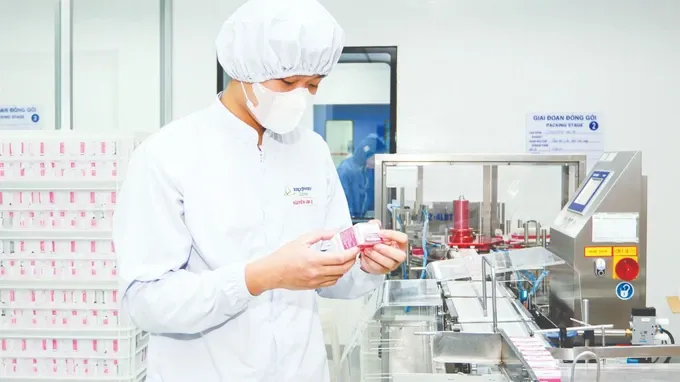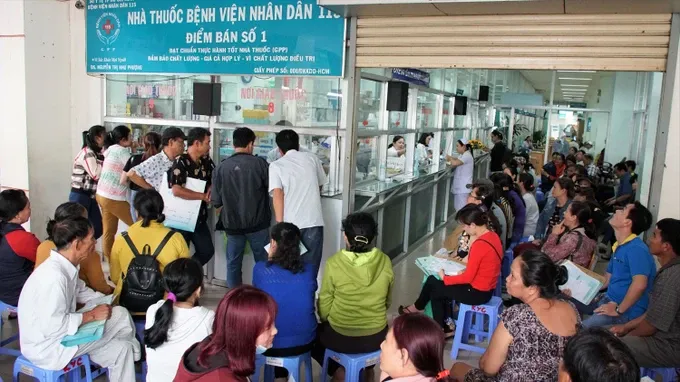
Minister of Health Dao Hong Lan commented that after more than seven years of implementing the 2016 Pharmaceutical Law, the pharmaceutical industry has achieved significant milestones. However, given the pressing demands and requirements from practical implementation, the pharmaceutical legal system has revealed some limitations and inadequacies.
Amending the Pharmaceutical Law is, therefore, necessary to ensure that people have access to quality, timely, and affordable drugs; to promptly address institutional and legal difficulties and obstacles in drug management via better legal corridors and simpler administrative procedures; and to ensure drug supply for disease prevention and control and for urgent cases arising in practice.
One of the highlights of the draft amended law is the strict management of drug prices to stabilize the drug market in accordance with the 2023 Price Law and to ensure the specific characteristics of the Pharmaceutical Law; at the same time, it protects the legitimate rights and interests of organizations, individuals engaged in business, consumers, and the State.
Deputy Head Tran Thi Nhi Ha of the People's Opinion Committee under the National Assembly Standing Committee stressed that drug price management is an extremely difficult issue and a very large content of the bill. This is also an issue that the public, drug businesses and manufacturers are waiting for.
The draft amended law has legalized and succeeded the previous regulation by introducing the acts of price publication and price declaration. "While in the past, with retail drugs, we did not have the concept of declaring retail prices; but in the new draft law, it will be necessary to stipulate that establishments must declare retail prices to the management agency in the locality and post prices on products," shared Deputy Head Tran Thi Nhi Ha.
The health sector must control drug quality and unify drug prices in the market. It is necessary to continue reviewing the draft law to eliminate any “negative or interest groups”. The reviewing agency must have a clear, impartial, objective, and disinterested opinion, unaffected by any individual or organization in the process of amending the law, with a spirit of “caution, accuracy, and synchronization” for the legitimate interests of the people, businesses, medical facilities; ensuring that the law has a long lifespan and that people's healthcare is better served.
National Assembly Chairman Tran Thanh Man
Experts in the field believe that the amended Pharmaceutical Law can support the development of the pharmaceutical industry, with regulations aimed at attracting investment to promote the development of this industry; prioritizing research, technology transfer, and production of innovative drugs, high-tech drugs, biological drugs/drug materials.

The law also adds many important incentives such as corporate income tax incentives; facilitating procedures for registering new drugs, original drugs, specialty drugs, biotechnology drugs, generic drugs, traditional drugs produced on high-tech production lines and from GACP-WHO-compliant sources; more priorities on the procedures for registering and licensing the import of rare drugs, vaccines that have been pre-qualified by the World Health Organization, and drugs that have been clinically tested in Vietnam.
Agreeing with the above opinions, Head Chu Dang Trung of the Legal Affairs and Integration Unit of the Drug Administration Department (Ministry of Health) commented that the draft amended Pharmaceutical Law has many breakthrough incentives compared to the 2016 version in order to promote the development of the pharmaceutical industry.
The draft amended Pharmaceutical Law also clearly states the policies, forms, and levels of incentives (prescribing projects that benefit from preferential policies and investment support, especially those for the production of new drugs, innovative drugs, original drugs, etc.), and simultaneously expanding business rights for foreign-invested pharmaceutical enterprises in Vietnam.
Specifically, this legal document allows these enterprises to directly distribute drugs produced by themselves, from contract manufacturing, and transfer technology in Vietnam, attracting foreign-invested enterprises (FIE) to invest in this area to enhance domestic production capacity.
Many Legal Gaps with Medical Oxygen
According to the WHO, Medical oxygen plays an essential role in medical facilities, clearly demonstrating its importance in the COVID-19 pandemic. In some cases, medical oxygen plays a therapeutic role like a drug (hyperbaric oxygen).
Medical oxygen was previously regulated in decrees on the management of medical equipment. However, Decree No. 98/2021/ND-CP and Decree No. 07/2023/ND-CP amending Decree No. 98/2021/ND-CP do not regulate this product. The draft amended Pharmaceutical Law also no longer contains content on medical oxygen.
Head Le Ngoc Danh of the Pharmaceutical Professional Unit under the HCMC Department of Health shared that it is necessary to clarify the provisions on medical oxygen or have a separate provision in the draft amended Pharmaceutical Law as there is a legal gap for this very important and essential product. Without any content on medical oxygen, it is challenging to purchase and manage this and other medical gases in the future, not to mention the inability to have health insurance reimburse it in the medical bill.
Carefully Evaluating Regulations on Online Drug Sales
Assoc Prof Dr Pham Khanh Phong Lan, President of the HCMC Pharmaceutical Association, is worried that if online drug sales are allowed, there will be many risks, especially the one of counterfeit and substandard drugs.
In the context of inadequate management of traditional pharmacies, it is absolutely not allowed to put prescription drugs on the list of items that can be sold online. For over-the-counter drugs, it must be carefully considered and should only be applied when legal regulations have been fully perfected. Now is not the right time to implement online drug sales.
Meanwhile, Mr. Nguyen Anh Tri, a National Assembly Deputy and former Director of the Central Hematology and Blood Transfusion Institute, expressed agreement with the receipt and adjustment of the draft amended Pharmaceutical Law related to the management of drug business through e-commerce, mainly for the sale of over-the-counter drugs, while online sales of prescription drugs must follow specific conditions.
90 percent of Domestically Produced Drug Ingredients Are Imported
Vietnam aims to become a center for high-value pharmaceutical production in the region by 2030, with an export value of domestically produced drugs of about US$1 billion by 2030 and US$20 billion by 2045. At the same time, it will receive technology transfer, contract manufacturing with technology transfer for the production of at least 100 original drugs, vaccines, biological products, and some drugs that Vietnam has not yet produced.
Statistics from the Ministry of Health showed that in 2023, nearly 90 percent of raw materials for drug production were imported. The proportion of drugs assessed as bioequivalent is low, at only about 10 percent. Domestically produced drugs are not highly competitive. More than 200 enterprises mainly produce generic drugs.
























